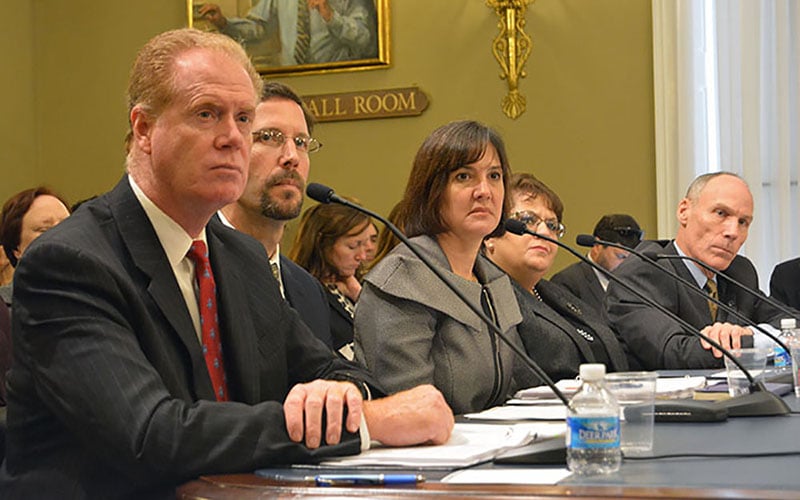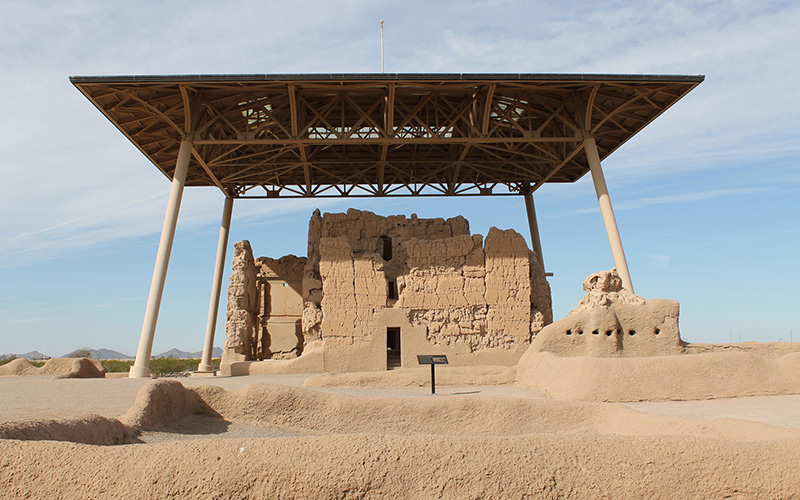
Deputy Assistant Interior Secretary Kristen Sarri, center, told House lawmakers that the Land and Water Conservation Fund was “one of the best tools” the government had for enriching American’s outdoor experiences. But Tom Wolfe, right, said states can better do that job. (Photo by Charles McConnell/Cronkite News)

Casa Grande Ruins National Monument is the site of an ancient Hohokam farming community that thrived along the Gila River for 1,000 years. The monument is just one of the Arizona sites that have been supported with money from the Land and Water Conservation Fund. (Photo by Cortney Bennett/Cronkite News)

Rep. Rob Bishop, R-Utah, with white hair, sits next to Rep. Raul Grijalva, D-Tucson, in sweater vest. The chairman and ranking member, respectively, of the House Natural Resources Committee introduced competing bills to replace the Land and Water Conservation Fund. (Photo by Charles McConnell/Cronkite News)
WASHINGTON – Both sides agree that the Land and Water Conservation Fund should be restored, but they could not agree Wednesday on what the new fund should look like or how to spend the $900 million it receives in a typical year.
The fund used oil and gas royalties from offshore leases to buy land for parks and to support recreation projects, allocating about $17 billion over the 50 years it operated before Congress failed to renew it this fall. Arizona projects got $223 million from the fund during that time.
“LWCF is one of the best tools our nation has to enrich the great outdoors for all Americans,” said Kristen Sarri, a deputy assistant secretary with the Interior Department, in testimony Wednesday to the House Natural Resources Committee.
The committee was hearing one of two competing visions for renewing the fund, a Republican bill that would still spend the royalty money but cap the amount the federal government could use to buy land, and require a minimum amount go directly to states.
Democrats blasted the Protecting America’s Recreation and Conservation Act, saying it unnecessarily micromanages a program that has worked well. And the called it a gift to oil and gas companies, noting that a draft of the bill called for “not less than 20 percent” of the fund be used to promote offshore energy.
“The second half of the bill is quite frankly a rebate – a subsidy to oil and gas industry,” said Rep. Raul Grijalva, D-Tucson.
“LWCF … returns a small slice of Big Oil’s profits to the American people through this trust and through this fund,” he said. “This bill would actually give these oil companies a chunk of the money back.”
Grijalva in April introduced a bill that would have reauthorized the fund permanently, with few changes. Despite drawing 195 co-sponsors, the bill has yet to get a hearing.
Even though Grijalva’s bill was not on the table Wednesday, some at the hearing said it is time to move away from the old funding formula that his bill would revive. They called it a slush fund for the federal government to grab land it doesn’t need.
“We see the federal government expanding their breadth across this country, particularly in Arizona, where … the majority of our public lands are held by the federal government,” said Rep. Paul Gosar, R-Prescott.
The Republican bill, sponsored by Rep. Rob Bishop, R-Utah, calls for no less than 45 percent of allocated royalties from the fund go toward state grants and a maximum of 3.5 percent go to federal land acquisition projects. Bishop noted that while the old fund allowed up to 60 percent for states, only about 12.5 percent has gone to those projects in recent years.
Tom Wolfe, a public affairs advocate who testified Wednesday, cited a study done before the fund was created that said “the states play the pivotal role in providing outdoor recreation resources.” Wolfe and other supporters of Bishop’s bill say it is important to expand funding to states while limiting funds for federal land acquisition.
But Grijalva dismissed claims that the LWCF is a “slush fund” for a federal “land grab,” getting Sarri to say that the government owns less land now than when the fund was created.
Democrats said many recreation projects that rely on the fund are suffering, with Grijalva noting in a letter to Bishop that “every hour that passes we lose more than $100,000,” or more than $120 million since the fund expired Sept. 30.
“With each passing month, that’s tens of millions of dollars more that the oil and gas industry gets to keep in their pocket instead of sending to the treasury to fund this program,” said Rep. Jared Huffman, D-Calif. “Leaving those funds in the pockets of the oil and gas industry may work for them, but it doesn’t work for our many needs and priorities.”
Critics said Bishop’s bill “hijacks” a program with a proven track record of success to reallocate the funds in a way that undermines the original intent of the fund. That followed remarks by Bishop supporters that the fund had been hijacked by environmental groups.
Before recessing Wednesday, Bishop promised to hold a hearing on Grijalva’s bill.
Several Democrats at the overflowing three-hour hearing Wednesday said they did not understand how the fund has become a partisan issue given its record and a history of bipartisan support.
“I know there are some things in Congress that we probably need to fight about – big clashes of ideas where we’re going to have big philosophical differences, some political differences – the system kind of depends on that clash of ideas,” Huffman said. “This program is not one of them.”